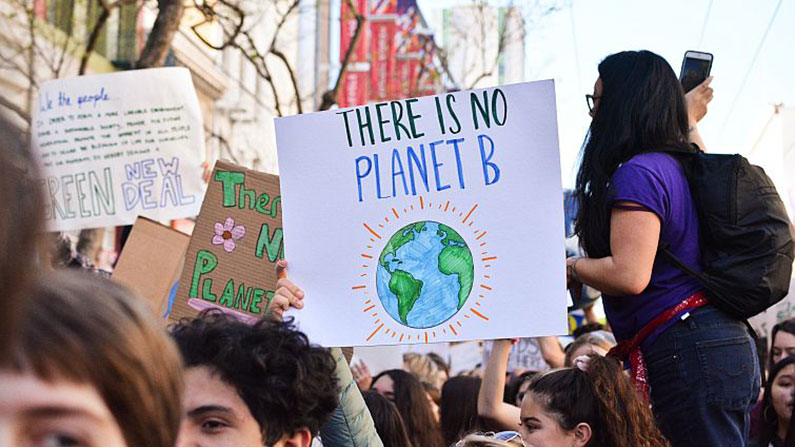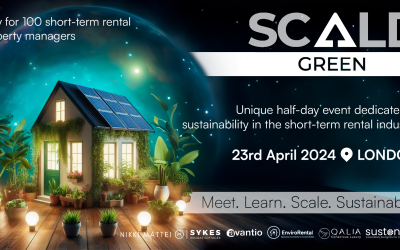Why is sustainability ugly?
The way that sustainability is perceived is still generally in a negative way. The words and phrases being used are ones like ‘net zero’, ‘decarbonization’ and ‘carbon neutral’. They do not exactly instil excitement or empathy. They sound costly, scientific, and difficult to understand. The concept of climate change is abstract. We cannot see carbon emissions and we only feel the effects in extreme weather events when the damage is already done.
Many people still have an outdated view of sustainability being about function over aesthetics. Terms like “eco-warrior” and “environmental activist” are often used which conjure up images of people who are extremists, wearing ethnic clothing and living off-grid in the woods. This is a very skewed view of the growing numbers of citizens who care about the natural world and other people.
The rise of eco-anxiety

Working with all generations to save the planet brings a sense of meaning and purpose
Mother Nature is naturally abundant and regenerative. Yet the world has never been more fragile. Many young people and children are overwhelmed with anxiety about climate change. They experience the pressure of facing an uncertain future. There is a pervading feeling of helplessness against the enormity of saving the planet. There is now even a word for this chronic fear of environmental doom: eco-anxiety.
In September 2021, a global survey led by Bath University found that nearly 60% of 16-25-year-olds felt very worried or extremely worried about climate change, with more than 45% saying this affected their daily lives. The same survey also showed that two-thirds reported emotions of sadness, fear, and anxiety. Feeling scared and anxious usually comes from a sense of being out of control or unable to do anything. The good news is that many of these young people are turning these feelings into action. Being involved in a community of like-minded people helps them feel part of making a difference.
What about ‘greenwashing’?
There is no point in older generations feeling guilty. If mistakes were made, they were usually decisions taken unknowingly. The most important thing is to learn from them and use them to find solutions. The easiest ways are simple steps that we can take in our own lives and our businesses. Actions that mean something to us and our loved ones. Actions that can be joyful and make us feel good. Collaborating with others to save the planet brings a sense of meaning and purpose.
In the business world, there is another new word: ‘greenwashing’. The definition is when a company makes misleading claims about its environmental credentials, leading the consumer to believe that they are making the best environmental choice by purchasing that product or service. Certain countries and organisations like the European Union have even brought in legislation to penalise businesses that make these false claims. However, this could be partly to blame for companies being reticent about their sustainability initiatives. They are afraid of being accused of not doing enough. In reality, very few companies actively set out to greenwash. Usually, they are just not being transparent enough about their plans or not providing adequate data to substantiate their claims. It does not mean that they are not serious about taking action.
What should sustainability mean?
Sustainability is a complex subject – there is no doubt about that. It is true that there is science and data involved but this is how our world runs. When you relate the subject to human lives on a more emotional level, sustainability is simple. It comes down to these three areas.
- reducing our overall consumption
- valuing and protecting the natural world
- treating people with dignity and fairness
Now these are topics that most people can relate to – certainly at least one. Energy bills have never been higher, and the cost of living is rising across the world. Countless market insights show us that there is more interest in experiences than accumulating ‘stuff’. Products that are vintage, upcycled, or use recycled materials have become fashionable. As well as the interest in eating local and supporting communities. Not to mention our love of nature …
Our connection with the natural world

Protecting marine life in our oceans is a key concern for consumers
Humans have a real connection with the natural world. When we are out in nature, feeling the sun on our faces and the wind in our hair, we feel more alive. Being locked up during the pandemic made us appreciate our innate connection with nature. Massively watched programmes like Sir David Attenborough’s ‘Blue Planet’ have played an influential role in raising concerns about the decline of the natural world. Being immersed in nature and ‘getting away from it all’ are significant drivers of tourism choices for growing numbers of travellers.
The tourism industry is all about people. The guests, the accommodation providers, the staff who work so hard to create the perfect guest experience, and all the suppliers who contribute. One of the key concerns of consumers today is diversity and inclusion and workers’ rights. We have the opportunity to make the system work for everyone.
Overall, it is clear to see that the three key areas of sustainability have a distinct human connection.
Sustainability is a perfect fit with the luxury market
The leading image in this article features QALIA Member, Villa Ubuntu in Bormes les Mimosas (France), which has achieved the Pledge Level of our responsible tourism standard. The villa has been built to be in harmony with the surrounding natural environment, using natural materials in a traditional Balinese style. Having our second-highest level means the villa owner has addressed both social and environmental criteria.
So let’s examine how sustainability does make sense for high-end villas. The four pillars of luxury are:
- excellence
- tradition
- know-how
- innovation
These fit exactly with the principles of sustainability when combined with the ethos of the triple bottom line. This alternative style of accounting means that sustainable products are profitable for the companies who make them but not at the cost of the natural world and the prosperity of everyone in their value chain.
Luxury brands across so many industries are using sustainable materials and making conscious luxury desirable. These types of products are naturally seen as of the highest quality with a personal touch, harking back to the days of bespoke designs and craftsmanship. You can see this trend in fashion, automotive, food, and beauty. The trailblazing companies here have made sustainability appealing and ‘sexy’.
The growth of conscious luxury travel

Guests appreciate hand-made products by local artisans
With the rise of sustainable luxury, the tourism industry has finally started to engage. Luxury brands have realised that their discerning clients are expecting to stay in sustainable hotels and private accommodations. They want to see cutting-edge green technologies running the properties. Organic local food and guest products made by artisans from the hosting community are seen as the optimum experience. As well as the opportunity to be immersed in the local culture and have a positive impact on the people living there. These trends are particularly prevalent amongst Millennials as illustrated in many research studies. We will explore this further in future articles.
The luxury hotel industry has already tapped into this growing trend for conscious luxury. When you read a publication like Condé Nast Traveller, the editorial about hotels and destinations frequently mentions sustainable initiatives. They highlight green technology like solar panels and EV chargers, as well as guest gifts made by local artisans and restaurants showcasing fresh, locally sourced food and drink.
Global hotel group Six Senses is an inspirational example of conscious luxury. This ethos is the foundation of the brand and every decision they make is taken through a sustainability lens. They have combined this with the ever-growing wellness trend which blends so well with sustainability. They understand that what is best for people is also best for the planet.
Another world-class hotel group committed to conscious luxury is SLH (Small Luxury Hotels of the World) which has created its Considerate Collection. The hotels in this collection have either achieved a GSTC (Global Sustainable Tourism Council) recognised certification or passed an assessment by the SLH Sustainability Advisory Panel, with independent and impartial review by the GSTC.
QALIA empowers leadership in the luxury private accommodation sector
At QALIA we prefer to use words like ‘conscious’ and ‘responsible’ rather than talking about ‘sustainability’. We believe that these are more human and relatable. The luxury hospitality sector has the unique opportunity to have a positive impact on destinations and communities. We aim to empower innovators and leaders within the luxury private rental sector to showcase their commitment to responsible tourism and conscious luxury.
QALIA provides a workable framework and personalized support to its Members when they decide that they want to be part of this style of hospitality and become a purpose-driven brand.










